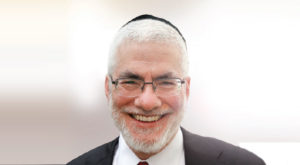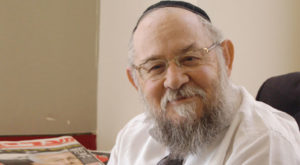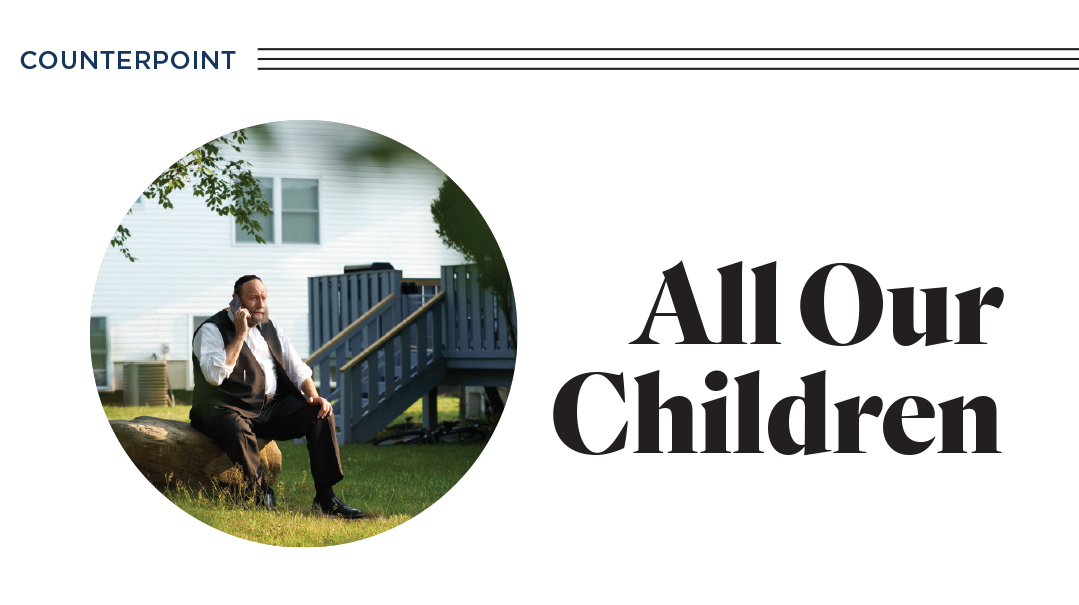Checks and Balances III

Another Path — Once in yeshivah, now rooted in chassidus
As graduates of our yeshivos and kollelim, we would like to express a viewpoint that seems to have been overlooked in the conversation regarding the difficulties of transitioning from yeshivah or kollel to the working world presented in Mishpacha’s special theme issue. It is with deep gratitude and respect for the yeshivos and kollelim in which we were educated and from which we have graduated that we attempt to express a different perspective, one shared by many Jews of all ages and backgrounds.
We have found that while the yeshivah system successfully fortified our appreciation for a particular style of limud haTorah, it implicitly marginalized other forms of avodas Hashem, making it seem as if the primary path toward spiritual success passed through the yeshivish style of learning. Yet for most working men, learning in that style — and finding satisfaction — is simply not practical. And any other avodas Hashem is implicitly only “kosher b’dieved,” which leads to frustration and anxiety and even bittul Torah.
It was only after discovering a somewhat different path that we realized the root of the issue and began the long road to true yishuv hada’as and simchah. As a chaburah, we focus now on Hashem as a perceivable Reality, Who seeks a personal relationship with each individual Jew regardless of circumstance. We contemplate the imminence of Hashem’s presence and work on maintaining a vibrant relationship with Him, and we nurture this relationship.
We have learned to think about Hashem not only in terms of sechar and onesh but as a loving Being, accessible and interested as a father in his children Whose presence in each particle of physicality grants His nation the opportunity of serving Him with every element of their lives. We see our lives outside of the beis medrash not as an obstacle to spiritual success, but as a means of aliyah.
This emotional commitment was not nurtured in our years in the yeshivah system, and this culminated in the angst we felt about moving on to the next stage in our lives and fulfilling the ratzon Hashem in doing our best to support our families in accordance with halachah and in an honest and respectable manner.
We feel that the issues magnified by one’s journey beyond the walls of the beis midrash, which include a loss of identity, a lack of connection, a crisis of faith, a slip into improper activities, and debilitating weakness to the culture which surrounds us, are outgrowths of a deficiency in the educational system of those very walls. We feel that while maintaining a seder each morning is of utmost importance, if it is intended merely to maintain a connection with one’s grand past as a ben Torah, it will not solve the issues listed above.
It has been our experience that the only thing that enables one to live an emotionally healthy life of depth, sensitivity, joy, principle, yishuv hada’as, loving relationships, and a general vitality for life is the building of a vibrant, emotional, and perceivably genuine relationship with Hashem through the opportunity presented by Yiddishkeit in all of its multifarious expressions — emunah, Shabbos Kodesh, all kinds of Torah study, tefillah, personal prayer, Yamim Tovim, tzaddikim, Tehillim, yearning, neginah, positive creativity, bringing out the inherent holiness of the Jewish soul seen as filling one’s present as an oveid Hashem.
For us, it was a change in focus, a realization that to be a Jew, in Hashem’s eyes, means fulfilling one’s kesubah in a respectable, faithful manner — and this, for us, is l’chatchilah. This shift in perspective enabled us to begin to break past the external shell in which our version of avodas Hashem had been trapped and encounter the great spirit of strength, inspiration, hope, health, balance, vitality, beauty, excitement, wonder, brilliance, relevance, and meaning that sits at the core of our eternal tradition.
Missing Pieces — Jonathan “Yoni” Burstyn, Chicago, IL
Thank you for a great issue relating the challenging situations that I and many others face daily. As a 29-year-old nursing home administrator and father of three, and alumnus of the mainstream yeshivos in Eretz Yisrael and the USA, allow me to add what was missed.
- Financial challenges. A young couple learning in kollel is most likely better off than a couple experiencing the difficult time period when the husband is in an entry-level job. I and many of my chevreh can attest how much more financially strapped we were during our first two to three years working (many will say it takes even longer) until we made a salary that met our family’s demands. When a husband goes to work, often the family will need a second car and lose their eligibility for government programs. For many, the financial crunch never really goes away. The middle class “hump” or doughnut hole — the term for those who make too much to qualify for government programs but not enough to meet the family’s demands — is a huge gap, and it is reality for so many.
- Time management. Most kollel yungeleit live relatively close to their yeshivos. I personally walked two times a day from Sanhedria Murchevet to the Mir for four years. In contrast, most jobs come with a commute — an hour each way is not uncommon. Being able to balance demands at home and a chavrusa is very difficult after a long train or car ride.
- A rebbi or rav who gets it. In recent years, we’ve seen a huge increase of senior kollel members of various communities taking on leadership roles in their respective communities. These positions require extensive training in counseling, shalom bayis, and being able to detect your shul members’ challenges. The achrayus that a rav holds is huge. Those of us who spend ten-plus hours a day at work are looking for more than a learning seder when we come to the local kollel for an hour each evening. We periodically will need a “schmooze session” with a rav that we look up to. Rabbanim today must be trained and prepared to guide bnei Torah in the specific challenges they face.
- Finding the right circle of friends. I am fortunate to live in a city where we have many kollel yungeleit whom I consider my friends, not just neighbors. But let’s face it: I’m not in kollel anymore. Finding a social circle can be challenging if you’re a “working yeshivah guy.”
- Career prep. Yeshivah/kollel leaning definitely prepares future balabatim in certain areas. For example, the maturity level of an entry-level ben Torah will likely give him an advantage over some coworkers, and he will probably be able to learn new concepts in a timely matter. However, accountability and being able to manage work stress is something I had to learn and work on my own.
That said, I would not change anything about the “yeshivah system.” My rebbeim and yeshivah have prepared me for the bigger picture of life — of which working is just a small part.
We're Adults Already — A. Zelowitz
R. L. from Far Rockaway wrote a response last week to the excellent theme issue Checks and Balances. At first she brought up some very valid questions asked by young adults as they transition to new chapters in their life’s journey.
But then she wrote something that was baffling and, in fact, somewhat insulting. She wrote that kollel yungeleit only ask these questions when leaving Kollel in their late twenties or early thirties when “they are only beginning adult responsibilities.”
Forgive me for disagreeing, but though I am still in kollel for the time being, I can still list a few “adult responsibilities” I currently manage: I am Baruch Hashem married with three children. No child’s play there. I pay my own bills and have to make a budget every month — especially now, with Yom Tov season coming up, to see if we can afford any new clothing for the kids. I have to come up with tuition money every month even after financial aid. I must manage my time between taking care of my family and having multiple chavrusos and sedarim from 9 a.m. until after 10 p.m. Shabbos comes every week, which means helping my wife with the shopping, cleaning, and cooking.
I can keep going but I think my point is clear enough by now. Adult responsibilities started way before I considered moving on past kollel, and though those responsibilities may experience some adjustments, I’m happy to be bringing along many years of experience.
Where's the Focus? — An idealistic wife
Thank you for your excellent coverage on the topic of bnei Torah in the workplace. It is a topic very dear to me as I grew up watching my father epitomize one who goes out to make a living but who spends his life living Torah.
My question actually involves those who are zocheh to still be in kollel, but whose lives do not have the same focus on Torah as those balabatim who carve out time to learn in their busy schedules. The kollel men I’m describing may spend their day in a learning environment, but it seems that their “life” comes from the outside world. They’ll come home after a full day of learning talking about cars, stocks and politics, spend their Shabbosim reading newspapers, and hardly ever even share a vort on the parshah. Of course, there are kollel men who are masmidim and their excitement and devotion for Torah spill over into the home even after kollel hours, but what about the other type of men?
As for my question: Is there a way a wife can instill in her husband a true love for Torah? Is there a way to ensure that the Torah remains the “ikar” in his life? Beyond the externals of dress and schedule, what will make Torah someone’s internal ikar?
I find that you can tell where a person is truly holding based on how he spends his free time, what he talks about, and what excites him. I would love to hear insight from both your columnists and readers on this topic.
May we all be zocheh to truly live Torah, regardless of how we spend the day from 9 – 5.
(Originally featured in Mishpacha, Issue 753)
Oops! We could not locate your form.










